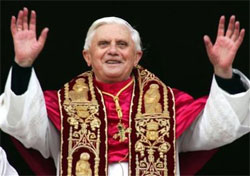 Prior to becoming Pope Benedict XVI, Carninal Joseph Ratzinger said the following in a homily.
Prior to becoming Pope Benedict XVI, Carninal Joseph Ratzinger said the following in a homily.
"Having a clear faith, based on the creed of the church, is often labeled today as a fundamentalism. Whereas relativism, which is letting oneself be tossed and ‘swept along by every wind of teaching,’ looks like the only attitude acceptable to today’s standards."
"We are moving toward a dictatorship of relativism which does not recognize anything as for certain and which has as its highest goal one’s own ego and one’s own desires."
Compare this to John Paul II’s 1993 encyclical Veritatis Splendor (101).
"In the political sphere, it must be noted that truthfulness in the relations between those governing and those governed, openness in public administration, impartiality in the service of the body politic, respect for the rights of political adversaries, safeguarding the rights of the accused against summary trials and convictions, the just and honest use of public funds, the rejection of equivocal or illicit means in order to gain, preserve or increase power at any cost – all these are principles which are primarily rooted in, and in fact derive their singular urgency from, the transcendent value of the person and the objective moral demands of the functioning of States. When these principles are not observed, the very basis of political coexistence is weakened and the life of society itself is gradually jeopardized, threatened and doomed to decay (cf. Ps 14:3-4; Rev 18:2-3, 9-24). Today, when many countries have seen the fall of ideologies which bound politics to a totalitarian conception of the world – Marxism being the foremost of these – there is no less grave a danger that the fundamental rights of the human person will be denied and that the religious yearnings which arise in the heart of every human being will be absorbed once again into politics. This is the risk of an alliance between democracy and ethical relativism, which would remove any sure moral reference point from political and social life, and on a deeper level make the acknowledgement of truth impossible. Indeed, ‘if there is no ultimate truth to guide and direct political activity, then ideas and convictions can easily be manipulated for reasons of power. As history demonstrates, a democracy without values easily turns into open or thinly disguised totalitarianism’"
"Thus, in every sphere of personal, family, social and political life, morality – founded upon truth and open in truth to authentic freedom – renders a primordial, indispensable and immensely valuable service not only for the individual person and his growth in the good, but also for society and its genuine development."
As William Donahue said, "The Catholic League is delighted. Those who are not need to do some real soul searching.". Amen. Long live the pope!
 Prior to becoming Pope Benedict XVI, Carninal Joseph Ratzinger said the following in a homily.
Prior to becoming Pope Benedict XVI, Carninal Joseph Ratzinger said the following in a homily.